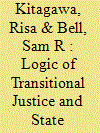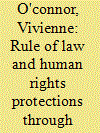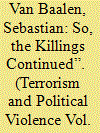| Srl | Item |
| 1 |
ID:
186338


|
|
|
|
|
| Summary/Abstract |
Human rights prosecutions addressing wartime crimes are often credited with deterring future rights abuses, but routinely occur alongside state repression. This article develops a theory of how such prosecutions generate uneven effects across domestic human rights practice by making some repression tactics costlier than others—in the public visibility of the abuse or ease of attribution to leadership—or by directly substituting certain tactics. We test the implications with a multivariate probit analysis of novel prosecution data in contemporary conflict and post-conflict settings. Trials significantly reduce reliance on political imprisonment and extrajudicial killings, relatively visible abuses, whereas gains for less visible physical integrity rights are limited. Further, trials themselves are sometimes deployed as a direct substitute for political imprisonment. The findings reveal how human rights prosecutions themselves can be part of a government’s repressive toolkit, with implications for the study of transitional justice and the judicialization of repression.
|
|
|
|
|
|
|
|
|
|
|
|
|
|
|
|
| 2 |
ID:
075711


|
|
|
|
|
| Publication |
2006.
|
| Summary/Abstract |
This article examines the inter-relationship between the rule of law, criminal law reform and international human rights norms and standards in post-conflict societies from a theoretical as well as a practical perspective. In several peace operations, both national and international actors have faced significant challenges in reforming the domestic criminal law framework. Reflecting upon these challenges, many practitioners have called for the creation of 'law reform tools'. With the aim of providing such tools, the Model Codes for Post-conflict Criminal Justice Project has developed a set of model criminal laws. The model codes have been drafted in a manner that is fully compliant with international human rights norms and standards in the field of criminal proceedings. The article discusses how such model codes may meaningfully contribute to domestic criminal law reform efforts, not as a panacea but a start for enhanced human rights protection in post-conflict states.
|
|
|
|
|
|
|
|
|
|
|
|
|
|
|
|
| 3 |
ID:
169927


|
|
|
|
|
| Summary/Abstract |
Many post-war states experience continuous low-intensity violence for years after the formal end of the conflict. Existing theories often focus on country-level explanations of post-war violence, such as the presence of spoilers or the nature of the peace agreement. Yet, post-war violence does not affect all communities equally; whereas some remain entrenched in violence, others escape the perpetuation of violent conflict. We argue that communities where wartime mobilization at the local level is based on the formation of alliances between armed groups and local elites are more likely to experience post-war violence, than communities where armed groups generate civilian support based on grassroots backing of the group’s political objectives. We explore this argument in a comparison of three communities in KwaZulu-Natal, South Africa, which have experienced different levels of post-war violence. The analysis supports the main argument and contributes to the research on the microdynamics of civil war by outlining the implications of certain strategies of wartime mobilization and how these may generate localized legacies.
|
|
|
|
|
|
|
|
|
|
|
|
|
|
|
|